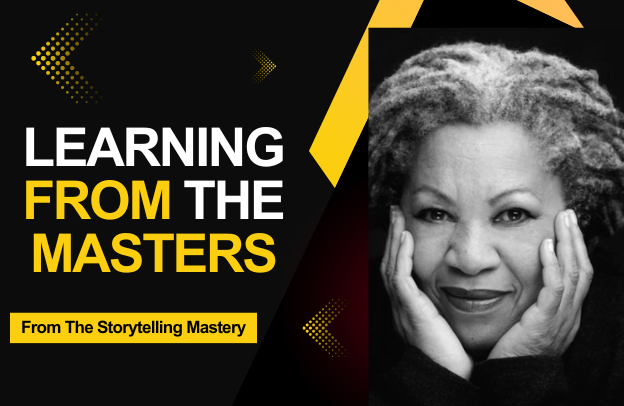5 Best Business Lessons from Warren Buffett: A Blueprint for Success

Warren Buffett, often referred to as the “Oracle of Omaha,” has been a towering figure in the investment world for decades. His philosophy and strategies have made him one of the wealthiest individuals globally, with a net worth that consistently places him among the richest people on the planet.
Want to learn more about storytelling? Start by downloading the first chapter of The Storytelling Mastery.
But beyond his financial success, Buffett’s principles offer invaluable lessons for anyone in business, a blueprint for success in our ever-busy world where many people are looking for ways to own their sources of income.
In this article, we will explore five of Buffett’s most profound business lessons and illustrate how they can be applied in today’s dynamic marketplace. If that sounds like what you are interested in, then keep reading.
Lesson 1: Value Investing because it’s good for you
Investing is at the heart of Warren Buffett’s business philosophy. This approach involves buying stocks that might appear undervalued by the market. Buffett learned this technique from his mentor, Benjamin Graham, and it has been a cornerstone of his success.
Consider this Real-world Example: In the 1960s, American Express faced a major crisis when it was implicated in the so-called “salad oil scandal.” The company’s stock plummeted as investors feared the worst.
However, Buffett saw this as an opportunity. He recognized that the intrinsic value of American Express was far greater than its market price. He invested heavily, and within a few years, the company’s stock had rebounded, providing substantial returns for his investment.
See also Billionaire Investor, Warren Buffett Speaks With CNBC’s Becky Quick On “Squawk Box”
As an actionable Insight, modern investors can apply value investing principles by conducting thorough research to identify undervalued companies with strong fundamentals.
Tools like discounted cash flow analysis, price-to-earnings ratios, and understanding the competitive advantages of a business can help in making informed decisions. Additionally, staying patient and avoiding the temptation to follow the market hype can lead to discovering hidden gems in the stock market.
Lesson 2: Develop your Circle of Competence
Buffett frequently emphasizes the importance of understanding and staying within one’s circle of competence. Your Circle of Competence refers to the areas where you have a deep understanding, expertise, and skills.
Think of a small circle around a skill or domain you have mastered over the years. Inside this circle, you intuitively grasp the possibilities, limitations, and nuances. You can effectively navigate challenges and avoid common pitfalls.
Imagine, for instance, an experienced photographer who knows how to use his or her camera, direct photoshoots, and capture subjects in ways a beginner might not even be aware of. Knowing these will help you stand out in the competition because you will be operating within your unique circle of competence.
Now, here are some steps to help you develop and leverage your Circle of Competence:
- Measure Your Performance: Reflect on your performance within your circle. Use a journal or a similar system to set goals and strive for improvement through practice.
- Push Your Boundaries: While most of your time should be spent within your circle, allocate about 20% of your time to explore new areas. These exciting ventures may have higher risks but can lead to growth and expansion.
- Reassess Your Circle: Regularly evaluate your competencies. As you learn and grow, your circle can expand. Be open to adjusting its boundaries based on your evolving skills and knowledge.
Remember this, mastery comes from a combination of childlike intuition and rigorous adult follow-through. By continuously developing your circle, you’ll make better decisions and achieve greater success!
Buffett’s Application:
Buffett has famously avoided investing in technology companies for many years, not because he believed they were bad investments, but because he didn’t understand them well enough. Instead, he focused on industries like insurance, consumer goods, and banking, where he had a deeper understanding.
To apply this lesson, individuals and businesses should identify their strengths and focus their efforts accordingly.
For instance, an entrepreneur with extensive experience in retail should concentrate on retail-related ventures rather than branching out into unrelated industries. Remember also that expanding one’s circle of competence is valuable, but it should be done gradually and with thorough research and learning.
See also Niche Research For Solopreneurs – How To Pick A Good Niche For Your Business
Lesson 3: Leverage Long-term Perspective to Your Advantage
Buffett’s investment strategy is famously long-term. He once said, “Our favorite holding period is forever.” This approach is based on the belief that the stock market will reward patient investors who are willing to hold onto their investments through market fluctuations.
A prime example of Buffett’s long-term perspective is his investment in Coca-Cola. Buffett began purchasing Coca-Cola shares in 1988 and has held onto them ever since. Over the years, the value of Coca-Cola has increased significantly, and it has provided substantial dividends, showcasing the benefits of its long-term investment strategy.
What can be the Strategic Advice? Well, investors can cultivate a long-term perspective by focusing on the underlying value of their investments rather than short-term market movements.
This involves looking for companies with durable competitive advantages, solid management teams, and consistent earnings growth. By adopting a long-term mindset, investors can reduce the emotional impact of market volatility and make more rational investment decisions.
Lesson 4: Importance of Reputation
Buffett often highlights the importance of reputation in business. He believes that it takes years to build a good reputation but only moments to destroy it. This principle guides his personal conduct and business decisions.
There are Historical Instances to this: In 1991, Salomon Brothers, an investment bank in which Buffett had a significant stake, was embroiled in a scandal involving the illegal bidding of Treasury securities.
Buffett stepped in as interim chairman to restore the company’s reputation. His insistence on ethical behavior and transparency helped salvage the firm’s standing and rebuild trust with regulators and investors.
So Reputation matters Management and Businesses can build and maintain a strong reputation by prioritizing ethical practices, transparency, and accountability. This can involve fostering a culture of integrity, ensuring clear and honest communication with stakeholders, and being proactive in addressing any issues that may arise.
Companies should also engage in corporate social responsibility activities to enhance their public image and build goodwill.
Lesson 5: Frugality and Cost Management
Despite his immense wealth, Buffett is known for his frugality. He lives in the same house he bought in 1958 and is famously averse to unnecessary spending. This principle extends to his business practices as well.
What we are essentially talking about here is building a good Lifestyle: Buffett’s frugality is not about being cheap but about being wise with money. He avoids lavish expenditures and focuses on value. For example, he still enjoys simple pleasures like dining at McDonald’s and drinking Coca-Cola. These are his values and he stands by them.
Think also about his Business Practices: At Berkshire Hathaway, Buffett’s approach to cost management is evident. He avoids flashy offices and extravagant perks. Instead, he focuses on operational efficiency and cost control. This frugal mindset helps in maximizing profits and ensuring sustainable growth.
As actionable Tips, businesses can consider implementing cost-effective measures by regularly reviewing expenses and cutting unnecessary costs.
Emphasizing efficiency, negotiating better terms with suppliers, and adopting a lean operational model can help maintain a healthy bottom line. Additionally, fostering a culture of frugality among employees can lead also to more mindful spending and resource utilization.
Conclusion on 5 Best Business Lessons from Warren Buffett
The lessons from Warren Buffett are both timeless and practical. By embracing value investing, staying within one’s circle of competence, and adopting a long-term perspective, businesses can achieve sustainable success.
See also 35 Tops Warren Buffett Top Quotes About Money
Of course, Buffett’s wisdom goes beyond mere financial gain; it encompasses a philosophy of thoughtful, ethical, and disciplined living. As we navigate the complexities of today’s business environment, these principles offer a reliable blueprint for achieving enduring prosperity and making a meaningful impact.
Want to learn more about storytelling? Start by downloading the first chapter of The Storytelling Mastery.





